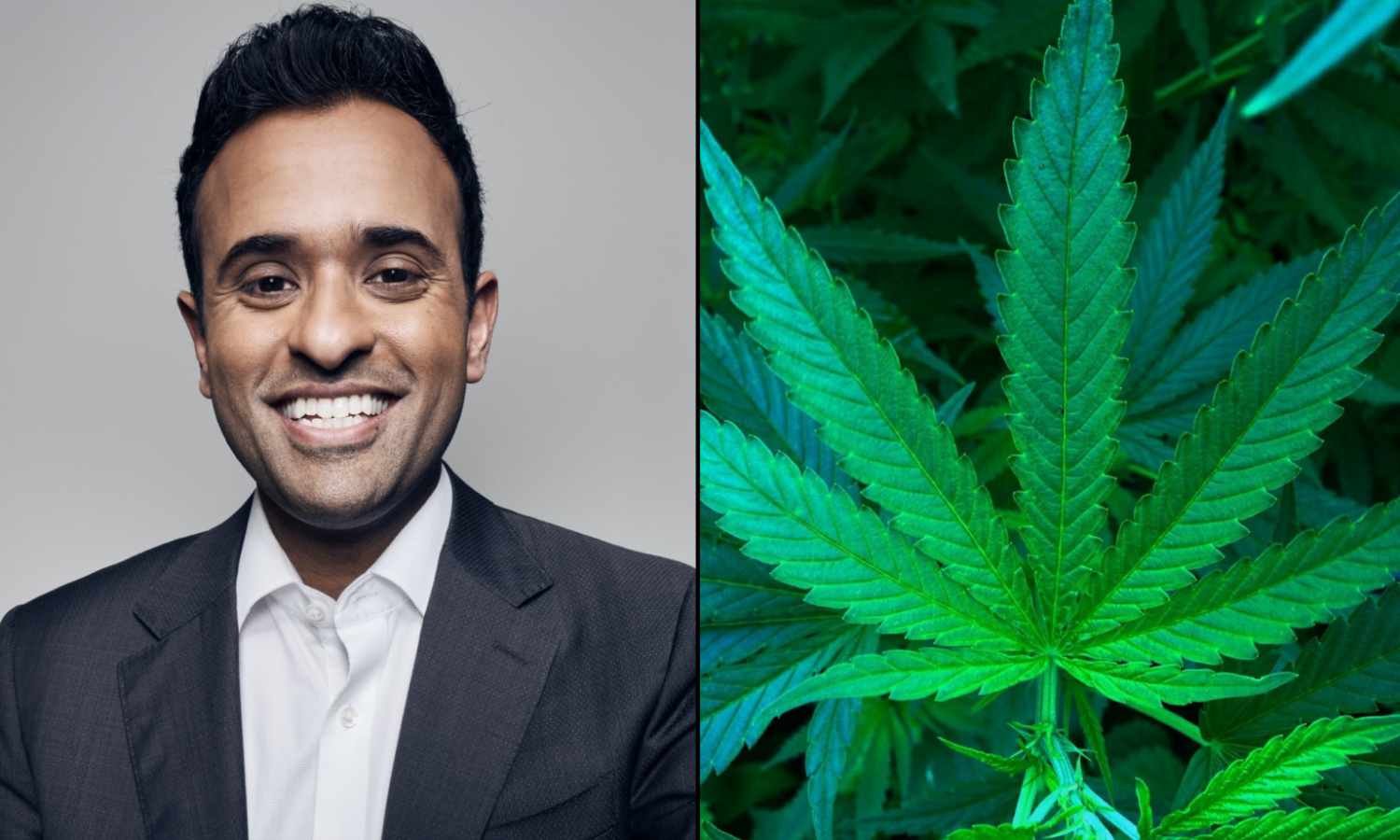Ohio voters on Tuesday passed a ballot initiative to legalize adult-use marijuana, but one resident who voted against the change was GOP presidential candidate Vivek Ramaswamy. Although the 38-year-old pharmaceutical company founder has said he supports legal access to marijuana and psychedelics, he opposed legalization in his home state.
“I voted no on that one,” Ramaswamy said on CNN Tuesday night, as the network projected that voters had passed the legalization measure, Issue 2. “I think it’s an abandonment of the rule of law when you have one set of rules at the federal level but state laws that contradict federal law. I don’t think that helps our commitment to the rule of law. I think it creates a lot of confusion in this country.”
The GOP contender also took issue with how the Ohio ballot measure allocates cannabis revenue.
“The tax proceeds here were directed towards purposes that I think have no place, equity programs or otherwise, that are completely irrelevant to the measure at issue,” he said.
Ramaswamy wrinkled his brow when CNN anchor Kaitlan Collins asked him whether he felt “out of touch with your other Ohioans given the fact that you voted no on the abortion rights issue and you voted no on the marijuana issue and both have passed.”
“I think to call that out of touch is out of touch, Kaitlan,” he replied, growing combative. “You were asking me if I feel out of touch because I sided with 45 percent of people rather than 55 percent of people or wherever the numbers end up shaking out.”
While Issue 2 won on a 57–43 margin, a poll released last month found that more than 7 in 10 voters (71 percent) in Ramaswamy’s age group (18–49) supported Issue 2, regardless of political party.
“The reality is I think we have legitimate, substantive debates we ought to have in this country,” Ramaswamy continued. “My view is let’s have them respectfully in the open where every citizens voice and vote counts equally.”
Ramaswamy has previously said he supports raising the U.S. voting age to 25, a change that would require a constitutional amendment.
The candidate also explained his opposition to Issue 2 in an interview with NBC News on Tuesday afternoon.
“I think that there’s room for reasonable discussion at the federal level about what these policies should be, but I don’t think we’re doing a service to the rule of law in this country, where we have continual departures” between federal and state cannabis laws, he said.
“I am open to a rational discussion about what, for example, veterans who suffer from certain conditions of pain or PTSD might be have available to them. Let’s have that discussion at the federal level,” he told NBC. “That’s where the federal drug laws are. But right now, at the state level, I do not think it is healthy for our country to see further chaos and confusion and conflicts between state and federal law.”
In the CNN interview, Ramaswamy seemed to indicate that he respects the result of the marijuana vote even if he disagrees with it.
“At the end of the day, we live in a constitutional republic,” he said. “That means we live by what the people vote for, according to the rules of that constitutional republic. And so, you know, it is what it is, and I understand that, but I disagree with the outcome that was reached.”
Despite his comments, Ramaswamy remains the only major 2024 GOP presidential candidate to publicly support both legalizing marijuana at the federal level and taking steps to provide regulated therapeutic access to some psychedelics.
It’s not the first time the opportunistic entrepreneur has made apparently conflicting comments about his drug policy positions, seeming to walk bolder calls for reform and at times challenge reporting on what specific proposals he endorses. He’s also raised eyebrows in the reform community by calling on the federal government to expand the Drug Enforcement Administration (DEA).
During a domestic policy speech in September, he detailed a proposal to fire about 75 percent of federal workers and shutter key agencies, but DEA would be exempt, while agents at the FBI would be transferred over to the drug agency.
On one hand, Ramaswamy has come out in public support of decriminalization of psychedelics and federal legalization of marijuana. On the other, he’s said he supports an extreme and militarized approach to the fentanyl overdose crisis, sending U.S. troops to the border to “annihilate” Mexican cartels in a “shock-and-awe” campaign.
“I will deploy the U.S. military to protect our *own* border instead of someone else’s. And I will annihilate the Mexican drug cartels: that’s how you end the fentanyl crisis which kills 50x the number of Americans each year vs. the number who died on 9/11,” he said on social media in April. “I refuse to be a passive buffoon who sits in the White House simply watching it happen: we’re going to finally solve this problem.”
Ramaswamy’s past statements suggest he could be an ally for the reform movement if elected president. But at the same time, while he’s commented on the bold plans, he’s also spent considerable time highlighting his proposals to use the military to combat fentanyl trafficking and to expand DEA—positions that would likely give pause to a drug war skeptic, as he’s characterized himself as being.
And given that he just admitted to opposing state-level marijuana reform as long as cannabis remains federally illegal, it’s unclear what drug policy issues the candidate would prioritize if elected to the White House. (Full Story)

